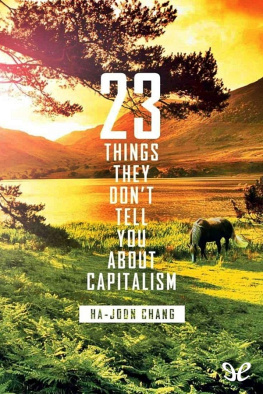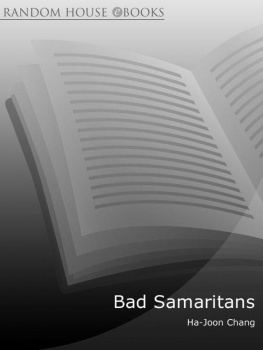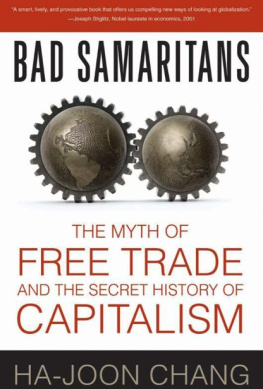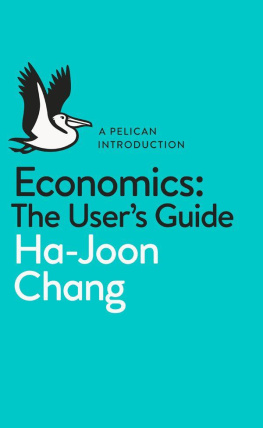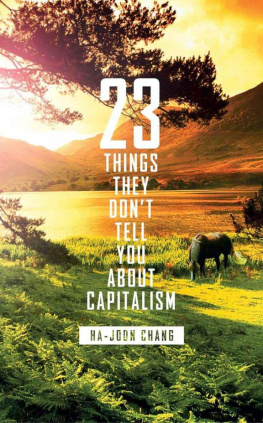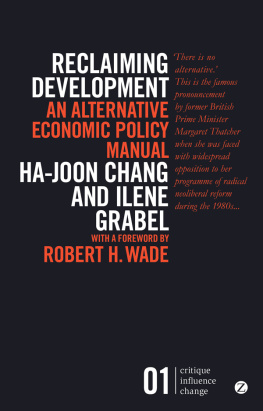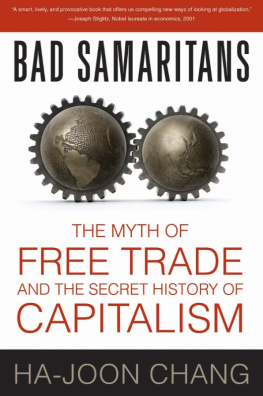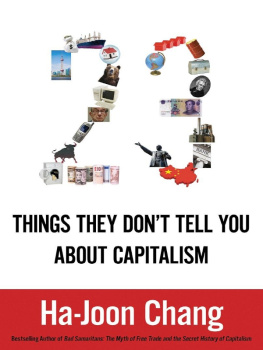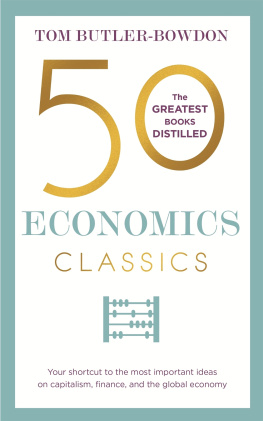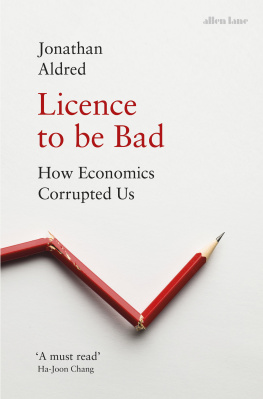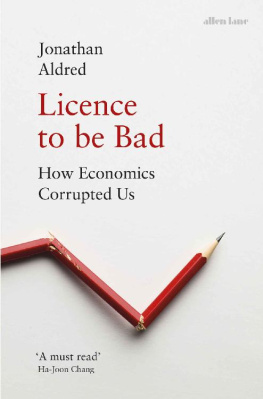Ha-Joon Chang - 23 Things They Don’t Tell You About Capitalism
Here you can read online Ha-Joon Chang - 23 Things They Don’t Tell You About Capitalism full text of the book (entire story) in english for free. Download pdf and epub, get meaning, cover and reviews about this ebook. year: 2010, publisher: ePubLibre, genre: Politics. Description of the work, (preface) as well as reviews are available. Best literature library LitArk.com created for fans of good reading and offers a wide selection of genres:
Romance novel
Science fiction
Adventure
Detective
Science
History
Home and family
Prose
Art
Politics
Computer
Non-fiction
Religion
Business
Children
Humor
Choose a favorite category and find really read worthwhile books. Enjoy immersion in the world of imagination, feel the emotions of the characters or learn something new for yourself, make an fascinating discovery.
- Book:23 Things They Don’t Tell You About Capitalism
- Author:
- Publisher:ePubLibre
- Genre:
- Year:2010
- Rating:3 / 5
- Favourites:Add to favourites
- Your mark:
- 60
- 1
- 2
- 3
- 4
- 5
23 Things They Don’t Tell You About Capitalism: summary, description and annotation
We offer to read an annotation, description, summary or preface (depends on what the author of the book "23 Things They Don’t Tell You About Capitalism" wrote himself). If you haven't found the necessary information about the book — write in the comments, we will try to find it.
23 Things They Don’t Tell You About Capitalism — read online for free the complete book (whole text) full work
Below is the text of the book, divided by pages. System saving the place of the last page read, allows you to conveniently read the book "23 Things They Don’t Tell You About Capitalism" online for free, without having to search again every time where you left off. Put a bookmark, and you can go to the page where you finished reading at any time.
Font size:
Interval:
Bookmark:
I have benefited from many people in writing this book. Having played such a pivotal role in bringing about my previous book, Bad Samaritans, which focused on the developing world, Ivan Mulcahy, my literary agent, gave me constant encouragement to write another book with a broader appeal. Peter Ginna, my editor at Bloomsbury USA, not only provided valuable editorial feedback but also played a crucial role in setting the tone of the book by coming up with the title, 23 Things They Dont Tell You about Capitalism, while I was conceptualizing the book. William Goodlad, my editor at Allen Lane, took the lead in the editorial work and did a superb job in getting everything just right.
Many people read chapters of the book and provided helpful comments. Duncan Green read all the chapters and gave me very useful advice, both content-wise and editorially. Geoff Harcourt and Deepak Nayyar read many of the chapters and provided sagacious advice. Dirk Bezemer, Chris Cramer, Shailaja Fennell, Patrick Imam, Deborah Johnston, Amy Klatzkin, Barry Lynn, Kenia Parsons, and Bob Rowthorn read various chapters and gave me valuable comments.
Without the help of my capable research assistants, I could not have got all the detailed information on which the book is built. I thank, in alphabetical order, Bhargav Adhvaryu, Hassan Akram, Antonio Andreoni, Yurendra Basnett, Muhammad Irfan, Veerayooth Kanchoochat, and Francesca Reinhardt, for their assistance.
I also would like to thank Seung-il Jeong and Buhm Lee for providing me with data that are not easily accessible.
Last but not least, I thank my family, without whose support and love the book would not have been finished. Hee-Jeong, my wife, not only gave me strong emotional support while I was writing the book but also read all the chapters and helped me formulate my arguments in a more coherent and user-friendly way. I was extremely pleased to see that, when I floated some of my ideas to Yuna, my daughter, she responded with a surprising intellectual maturity for a 14-year-old. Jin-Gyu, my son, gave me some very interesting ideas as well as a lot of moral support for the book. I dedicate this book to the three of them.
How to rebuild the world economy
The daunting task ahead of us is to completely rebuild the world economy. Things are not as bad as they were during the Great Depression only because governments have propped up demand through huge deficit spending and unprecedented easing of money supply (the Bank of England has never had a lower interest rate since it was founded in 1644), while preventing bank runs through expansion of deposit insurance and the bailing-out of many financial firms. Without these measures, and the substantial automatic increase in welfare spending (e.g., unemployment benefit), we could be living through a much worse economic crisis than that of the 1930s.
There are people who believe the currently dominant free-market system to be fundamentally sound. They assume that tinkering on the margins will be a sufficient solution to our condition a bit more transparency here, a tad more regulation there, and a modicum of restraints on executive pay over there. However, as I have tried to show, the fundamental theoretical and empirical assumptions behind free-market economics are highly questionable. Nothing short of a total re-envisioning of the way we organize our economy and society will do.
So what is to be done?
This is not a place to spell out all the detailed proposals required for the reconstruction of the world economy, many of which have been discussed in the foregoing 23 Things anyway. Here I will only outline some principles eight of them that I think we need to have in mind in redesigning our economic system.

To begin with: paraphrasing what Winston Churchill once said about democracy, let me restate my earlier position that capitalism is the worst economic system except for all the others. My criticism is of free-market capitalism, and not all kinds of capitalism.
The profit motive is still the most powerful and effective fuel to power our economy and we should exploit it to the full. But we must remember that letting it loose without any restraint is not the best way to make the most of it, as we have learned at great cost over the last three decades.
Likewise, the market is an exceptionally effective mechanism for coordinating complex economic activities across numerous economic agents, but it is no more than that a mechanism, a machine. And like all machines, it needs careful regulation and steering. In the same way that a car can be used to kill people when driven by a drunken driver, or to save lives when it helps us deliver an emergency patient to hospital in time, the market can do wonderful things but also deplorable ones. The same car can be made better by putting in improved brakes, more powerful engines or more efficient fuel, and the same market can be made to perform better through appropriate changes to the attitudes of the participants, their motives and the rules that govern it.
There are different ways to organize capitalism. Free-market capitalism is only one of them and not a very good one at that. The last three decades have shown that, contrary to the claims of its proponents, it slows down the economy, increases inequality and insecurity, and leads to more frequent (and sometimes massive) financial crashes.
There is no one ideal model. American capitalism is very different from Scandinavian capitalism, which in turn differs from the German or French varieties, not to speak of the Japanese form. For example, countries which find American-style economic inequality unacceptable (which some may not) may reduce it through a welfare state financed by high progressive income taxes (as in Sweden) or through restrictions on money-making opportunities themselves by, say, making the opening of large retail stores difficult (as in Japan). There is no simple way to choose between the two, even though I personally think that the Swedish model is better than the Japanese one, at least in this respect.
So capitalism, yes, but we need to end our love affair with unrestrained free-market capitalism, which has served humanity so poorly, and install a better-regulated variety. What that variety would be depends on our goals, values and beliefs.
Second: we should build our new economic system on the recognition that human rationality is severely limited. The 2008 crisis has revealed how the complexity of the world we have created, especially in the sphere of finance, has vastly outpaced our ability to understand and control it. Our economic system has had a mighty fall because it was rewired following the advice of economists who believe the human ability to deal with complexity is essentially unlimited.
The new world should be formed with a clear recognition that we have only limited powers of objective reasoning. It is suggested that we can prevent another major financial crisis by enhancing transparency. This is wrong. The fundamental problem is not our lack of information but our limited ability to process it. Indeed, if lack of transparency was the problem, the Scandinavian countries famously transparent would not have experienced a financial crisis in the early 1990s. As long as we continue to allow unlimited financial innovations, our ability to regulate will always be outstripped by our ability to innovate.
If we are really serious about preventing another crisis like the 2008 meltdown, we should simply ban complex financial instruments, unless they can be unambiguously shown to benefit society in the long run. This idea will be dismissed by some as outrageous. Its not. We do that all the time with other products think about the safety standards for food, drugs, automobiles and aeroplanes. What would result is an approval process whereby the impact of each new financial instrument, concocted by rocket scientists within financial firms, is assessed in terms of risks and rewards to our system as a whole in the long run, and not just in terms of short-term profits for those firms.
Font size:
Interval:
Bookmark:
Similar books «23 Things They Don’t Tell You About Capitalism»
Look at similar books to 23 Things They Don’t Tell You About Capitalism. We have selected literature similar in name and meaning in the hope of providing readers with more options to find new, interesting, not yet read works.
Discussion, reviews of the book 23 Things They Don’t Tell You About Capitalism and just readers' own opinions. Leave your comments, write what you think about the work, its meaning or the main characters. Specify what exactly you liked and what you didn't like, and why you think so.

